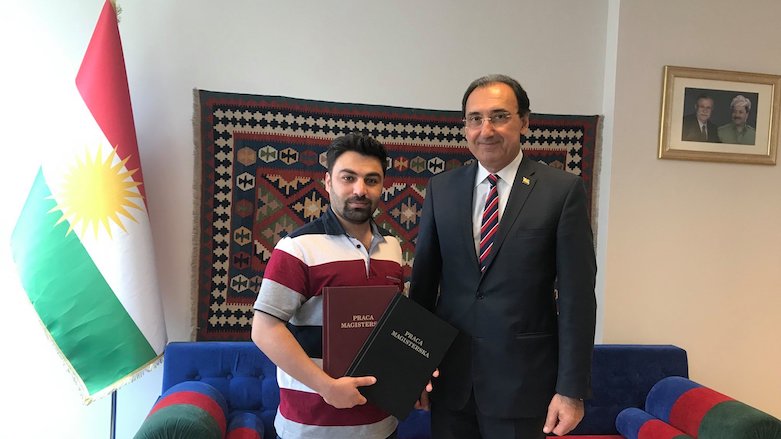Kurdish student in Poland successfully defends master’s thesis on legality of Kurdistan referendum

ERBIL (Kurdistan 24) – A Kurdish student in Poland has successfully defended his master’s thesis on the legitimacy of the Kurdistan Region’s historic 2017 independence referendum.
In his master’s thesis titled “The Political Legitimacy of the Kurdistan Region’s 2017 Referendum on Independence,” Lehat Salah Rasheed said he analyzed the reasons behind the decision to hold the vote as well as the internal and foreign reactions to it.
“The Kurdistan Region’s 2017 referendum on independence was of high importance not only for the Kurds but for regional and international powers since it revealed many facts,” Rasheed told Kurdistan 24.
“The disputes over whether or not the referendum was constitutional and legal are discussed [in my thesis], and it is justified that the referendum had no legal or constitutional obstacles.”
Rasheed, who defended his thesis at the University of Humanities and Economics in Lodz, Poland, had also defended a second master’s thesis at the Institute of English Philology.
After the successful defense of his two arguments, Rasheed visited the Kurdistan Regional Government’s (KRG) Representation office in Poland to meet with representative Ziyad Raoof and present him with his two master’s theses.
“The KRG Representative congratulated him on bringing up such important matters like the independence referendum in the thesis, and wished him success in his further professional and scientific career,” a statement from the KRG office in Poland said.
Kurdish student Lehat Salah Rasheed successfully defended his master thesis entitled “political legitimacy of the Kurdistan Region 2017 referendum on independence” at the University of Humanities and Economics in Lodz. Mr Lehat visited KRG Poland and met with @ZiyadRaoof pic.twitter.com/zFmKHPQSct
— KRG Poland (@KrgPoland) July 1, 2019
Indeed, Kurds across the Greater Kurdistan – which is divided within the borders of modern-day nations Iraq, Turkey, Iran, and Syria – continue to struggle for their right to self-determination.
The people in the Kurdistan Region arguably came the closest to realizing that dream when they held an independence referendum in September 2017 for secession from Iraq.
Although nearly 93 percent of voters called for independence, the central government in Baghdad rejected the legality of the plebiscite and responded with a set of punitive measures, including a flight ban and the use of military force to regain control of disputed regions all amid silence from the international community.
